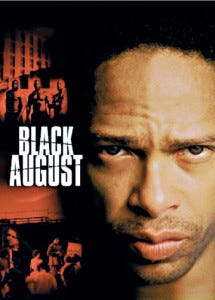“Black August” reveals itself not simply as fiction masquerading as history, but a poorly executed fiction at that.
Ostensibly a docudrama, Samm Styles and TCinque Sampson attempt detailing the publication process of George Jackson’s seminal work “Soledad Brother: The Prison Letters of George Jackson.”
Detailed are the difficulties in publishing the work. Threats come in from nearly every direction. Pressure is put upon all parties involved in releasing the book, creating a taut pressure cooker of a situation.

Throughout the film, Jackson himself is presented as a loquacious chain smoker. Those familiar with the film’s foundational text, from which many dubbed over quotations are heard, may know that not only was Jackson a nonsmoker, but introspective, often going on “talk fasts” during which he refused to speak to anyone.
These details are nominal, however, compared to the film’s other liberties. One is a rather salacious and graphically depicted affair with activist Angela Davis. This is highly unlikely given the pair met while Jackson was incarcerated at San Quentin. Another is the telling of Jackson’s death.
Furthermore, it becomes difficult to tell exactly where Davis fits into the whole equation based upon the information given. “Black August” never fully explains whether she is an operative of some established organization or simply Jackson’s sympathetic love interest.
Compounding the film’s historical issues are its technical aspects. Styles and Sampson seem to have difficulty choosing a modus operandi, vacillating between using a documentary-style hand cam, a steady cam, and other various art house style angles.
Questionable editing choices lead to an unnecessarily convoluted chronology, at times its washed out finish leaves it looking less like a work of the period than something of the 1970s exploitation milieu, and to describe the mise-en-scene as cheap would be putting matters politely.
Still, the cast of “Black August” soldiers on with varying degrees of success.
Cast in the lead role as Jackson himself, Gary Dourdan does a fair acting turn with the material he is given. Ezra Stanley, as George Jackson’s younger brother Jonathan, projects a palpable level of naïve honesty in his role.
The real standout is Vonetta McGee in the role of Jackson’s mother, Georgia. Hers is a dynamic performance of stoic strength in the face of adversity.
Unfortunately, the rest of the cast is inconsistent at best. For instance, Darren Bridgett ranges between forced and over-indulgent in his role as book editor David Dryer.
Screened Aug. 14 in San Francisco’s Mission District to serve the dual purpose of drawing awareness to, and making parallels between, Jackson’s struggle for human dignity and that of the ongoing hunger strike in San Quentin, “Black August” is as timely now as it was at the time of 2007 release date.
In the final analysis, however, a viewing of “Black August” may achieve some modicum of success insofar as motivating its viewers to pick up a copy of “Soledad Brother,” but its content must be taken as entertainment only.

























